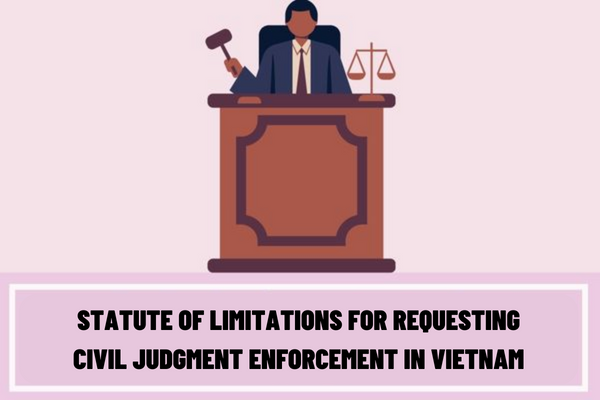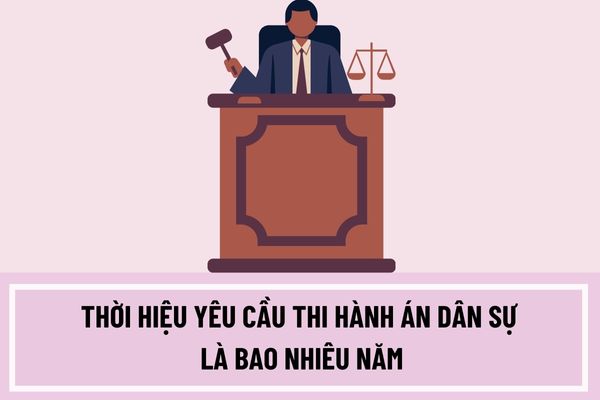How many years is the statute of limitations for requesting civil judgment enforcement in Vietnam? What are the contents of a written request for civil judgment enforcement in Vietnam?
- How many years is the statute of limitations for requesting civil judgment enforcement in Vietnam?
- What are the force majeure events related to the determination of the statute of limitations for requesting civil judgment enforcement in Vietnam?
- What are the contents of a written request for civil judgment enforcement in Vietnam?
How many years is the statute of limitations for requesting civil judgment enforcement in Vietnam?
Pursuant to the provisions of Article 30 of the 2008 Law on Enforcement of Civil Judgments in Vietnam stipulating as follows:
Statute of limitations for requesting judgment enforcement
1. Within 5 years after a judgment or ruling takes legal effect, the judgment creditor and judgment debtor may request a competent civil judgment enforcement agency to issue a judgment enforcement decision.
In case a time limit for fulfilling an obligation is set in the judgment or ruling, the 5-year statute of limitations will be counted from the date the obligation is due.
For judgments and rulings subject to periodical enforcement, the 5-year statute of limitations will apply to each period and be counted from the date the obligation is due.
2. In case of postponement or suspension of judgment enforcement under this Law, the postponement or suspension duration will not be counted into the statute of limitations for requesting judgment enforcement, unless judgment creditors agree to allow judgment debtors to postpone the judgment enforcement.
3. In case the judgment enforcement requesters can prove that he/she is unable to request judgment enforcement within the set time limit due to an objective obstacle or a force majeure circumstance, the duration when these objective obstacles or force majeure circumstance exists will not be counted into the statute of limitations for requesting judgment enforcement.
According to the above provisions, within 5 years after a judgment or ruling takes legal effect, the judgment creditor and judgment debtor may request a competent civil judgment enforcement agency to issue a judgment enforcement decision.
Thus, the statute of limitations for requesting judgment enforcement is 5 years after a judgment or ruling takes legal effect.

How many years is the statute of limitations for requesting civil judgment enforcement in Vietnam? What are the contents of a written request for civil judgment enforcement in Vietnam?
What are the force majeure events related to the determination of the statute of limitations for requesting civil judgment enforcement in Vietnam?
Pursuant to Article 4 of Decree No. 62/2015/ND-CP, a number of regulations are amended by Point a, Clause 2, Article 1 of Decree No. 33/2020/ND-CP as follows:
Time limit for requesting civil judgment enforcement
1. A litigant is entitled to request enforcement of a judgment within the time limit specified in Clause 1 Article 30 of the Law on Civil judgment enforcement.
2. Where enforcement of a judgment cannot be requested within the time limit specified in Clause 1 Article 30 of the Law on Civil judgment enforcement because of a force majeure event or inevitable difficulty, the litigant is entitled to request the head of a competent civil judgment enforcement authority to consider accepting the late request for enforcement.
3. The following events are considered force majeure events or inevitable difficulties:
a) Natural disasters, blazes, hostilities;
b) An objective obstacle is the case where the involved parties do not receive the judgment or decision through no fault of their own; the involved parties go on a business trip to border areas or islands but cannot request judgment enforcement on time; accident, serious illness to the point of loss of consciousness or the death of the litigant without having identified an heir; an organization that consolidates, merges, divides, separates, dissolves, converts form, transfers compulsorily, transfers all shares and contributed capital without identifying the new organization or individual has the right to claim enforce judgments according to the provisions of law or due to the fault of the adjudicating agency, judgment enforcement agency or other agency or individual, leading to the inability of the involved parties to request judgment enforcement on time.
Thus, force majeure events related to the determination of the statute of limitations for civil judgment enforcement are understood as cases of natural disaster, blazes, or hostilities.
What are the contents of a written request for civil judgment enforcement in Vietnam?
Pursuant to Article 31 of the 2008 Law on Enforcement of Civil Judgments in Vietnam as amended by Clause 13, Article 1 of the 2014 Law amending and supplementing a number of articles of the Law on Enforcement of Civil Judgments stipulating as follows:
Receipt or rejection of requests for judgment enforcement
1. An involved party may directly request or authorize another person to request judgment enforcement by filing a written request, making an oral request or sending a written request by post. The judgment enforcement requester shall submit relevant judgments, decisions or documents.
The date of sending a written request for judgment enforcement is the date when the judgment enforcement requester files the written request or makes an oral request or the date when the postmark is affixed by the sending post office.
2. A written request for judgment enforcement must have the following contents:
a/ Full name and address of the requester;
b/ Name of the civil judgment enforcement agency requested to enforce the judgment;
c/ Full names and addresses of the judgment creditor and judgment debtor;
d/ Contents of the judgment requested to be enforced;
dd/ Information on assets and judgment execution conditions of the judgment debtor, if any;
e/ Date of making the request;
f/ The signature or fingerprint of the requester. For a legal entity, its written request must bear the signature of its lawful representative and its seal, if any.
3. In case the judgment enforcement requester makes his/her request orally, the civil judgment enforcement agency shall make a written record to record the contents specified in Clause 2 of this Article. This written record which must bear the signature of the record maker is valid as a written request for judgment enforcement.
4. Upon receiving a written request for judgment enforcement, the civil judgment enforcement agency shall check the contents of the written request and enclosed documents, record it in the judgment enforcement request book and notify such in writing to the requester.
5. In the following cases civil judgment enforcement agencies may reject a written request for judgment enforcement and shall, within 5 working days after receiving the request, notify such in writing to the requester:
a/ The requester has no right to request judgment enforcement or the contents of the written request for judgment enforcement are irrelevant to the contents of the judgment or decision concerned; no rights or obligations of involved parties arise in the course of enforcement of the judgment or decision concerned in accordance with this Law;
b/ The civil judgment enforcement agency requested to enforce the judgment is incompetent to do so;
c/ The statute of limitations for requesting judgment enforcement has expired.
Thus, a written request for civil judgment enforcement must have the following contents:
- Full name and address of the requester;
- Name of the civil judgment enforcement agency requested to enforce the judgment;
- Full names and addresses of the judgment creditor and judgment debtor;
- Contents of the judgment requested to be enforced;
- Information on assets and judgment execution conditions of the judgment debtor, if any;
- Date of making the request;
- The signature or fingerprint of the requester. For a legal entity, its written request must bear the signature of its lawful representative and its seal, if any.
LawNet
